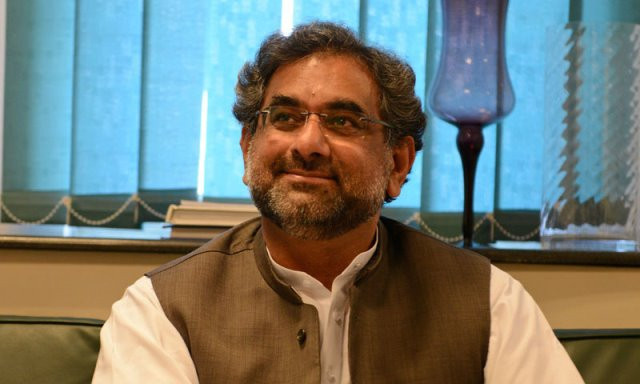Fuel shortages: Petroleum minister accepts blame for crisis
Finance minister ducks responsibility, calls shortages a ‘conspiracy against the govt’

Finance minister ducks responsibility, calls shortages a ‘conspiracy against the govt’
PHOTO: AFP
In a rare admission by a cabinet member, Petroleum Minister Shahid Khaqan Abbasi accepted responsibility for the acute petrol shortage in Punjab, even as his colleague Ishaq Dar, the finance minister, cleared himself of blame while terming the shortages a “conspiracy” against the government.
At a news conference in Islamabad on Monday, Dar admitted that the crisis was the result of the government’s mismanagement, becoming the second prominent cabinet member in two days to accept the government’s role in causing the shortages of petrol. On Sunday, Interior Minister Chaudhry Nisar Ali Khan also said the same thing. Neither Dar nor Nisar named any of their cabinet colleagues as bearing responsibility, but Dar hinted strongly that he felt that Abbasi and Water and Power Minister Khawaja Muhammad Asif were to blame.

Dar absolved himself and his ministry of responsibility by claiming that he no longer heads the Senate subcommittee on energy. Yet the finance ministry issued press releases on his behalf as late as January 5, detailing his activities before the committee. In addition, the Economic Reforms and Implementation Unit (ERIU), which is responsible for energy sector reforms, is housed within the finance ministry.
Despite the very open intra-cabinet squabbles, both Dar and Abbasi at least agree on one point: the energy sector’s circular debt – caused in large part by rampant electricity theft across the country – has nothing to do with the current shortages of petroleum.
At a separate news conference in Islamabad, Abbasi accepted personal responsibility for petrol shortages in Punjab while at the same time insisting that the crisis had nothing to do with the energy sector’s financial troubles. He also said that no state-owned company had defaulted on its debts, even though Pakistan State Oil, the largest oil company in the country, is currently unable to finance some of its oil purchases owing to a lack of payment on outstanding letters of credit.

Abbasi added that he expected the crisis to blow over within the next couple of days. Earlier last week, he had claimed that the crisis would have ended by last Saturday.
The petroleum minister said that the shortages were caused by the simultaneous shutdown in compressed natural gas (CNG) fuel stations across Punjab and Khyber-Pakhtunkhwa, coupled with an unprecedented 30% surge in demand for petrol. He added that the government is working to ensure that the supply of petrol increases from an average of 12,000 tons per day to 15,600 tons per day to meet demand. This will include the import of 680,000 tons of petrol over the next two weeks to ensure adequate supplies.
Meanwhile, the finance minister continued to engage in what can generously be described as a selective reading of the facts. Dar claimed that the finance ministry bears no responsibility for the recurring problem of circular debt in the power sector caused by electricity theft and inefficient state-owned oil companies, a debt that has now crossed Rs500 billion.

Dar insisted that the circular debt was entirely the water and power ministry’s problem, adding that the finance ministry’s only responsibility is to pay for the subsidies on electricity, not to account for the cost of theft and inefficiency. The finance ministry paid Rs480 billion to clear circular debt last year and has paid Rs129 billion in electricity subsidies during the first half of fiscal 2015, including Rs10 billion on Monday.
Unlike the petroleum minister, the finance minister made no distinction between state-owned and private-run oil companies when doling out the blame for insufficient inventories of petrol, even going so far as to cite his experience as a chartered accountant to say that he thought the companies were criminally negligent in not maintaining sufficient inventories. It is unclear how his accounting background adds credibility to his allegations.
Both Dar and Abbasi admitted that Prime Minister Nawaz Sharif was embarrassed by the crisis and had appointed an inquiry team to probe the causes of the crisis. The petroleum minister said that the team would be led by Zahid Muzaffar, the prime minister’s adviser on petroleum, and would include Water and Power Secretary Zafar Mehmood. The team is expected to report its findings to the prime minister on Tuesday (today).
Published in The Express Tribune, January 20th, 2015.
Poll
[poll id="1408"]





1733130350-0/Untitled-design-(76)1733130350-0-208x130.webp)













COMMENTS
Comments are moderated and generally will be posted if they are on-topic and not abusive.
For more information, please see our Comments FAQ